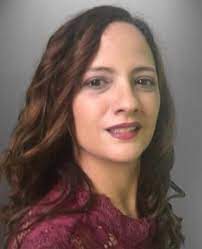
Investigadora: Dra. Liz M. Díaz Vázquez
La Dra. Liz M. Díaz Vázquez es natural de Barranquitas, Puerto Rico. La Dra. Díaz finalizó en el 2000 su bachillerato en Química en la Universidad de Puerto Rico Recinto de Rio Piedras y completó su Ph.D en Química Analítica en la misma institución en el 2005. La Dra. Díaz fue galardonada con varias estancias postdoctorales que fueron otorgadas en el 2007 por el Institute of Biotechnology Fellowship, en el 2009 por el Technology and Education Center for Renewable Energy (TECRE) Fellowship, en el 2011 por el Department of Homeland Security Faculty Team Summer Research Fellowship, y finalmente en 2014 y 2019 por el Analytical Science Digital Library (ASDL) Travel Fellowship. La Dra. Díaz ha enseñado algunos cursos que incluyen Química General, Química Analítica, Química Instrumental, Química Forense, Química Ambiental y Comunicación Científica. Actualmente, la Dra. Díaz es profesora y Directora del programa de Química de la Universidad de Puerto Rico Recinto de Rio Piedras, es Investigadora en el área de Química Analítica Ambiental y en el área de Educación en Química, es Directora del Center for Innovation Research and Education in Environmental Nanotechnology (CIRE2N), Co-Directora de PR-Sprint (Una alianza con NASA para adiestrar a estudiantes en áreas relacionas a las profesiones en NASA), Coordinadora de outreach y educación del Centro para el Avance de Tecnología Ponible (CAWT), Participa el Comité de la Mujer Sección ACS- Puerto Rico, Trabaja en el proyecto Vieques, Ambiente, Salud y Acción Comunitaria (VASAC) como Directora del componente que se lleva a cabo en el Recinto de Río Piedras, es la fundadora de la iniciativa la Mujer en la Ciencia y es la Investigadora Principal del Centro de Recursos de CAHREUS. La Dra. Díaz con sus proyectos de investigación en Química Analítica Ambiental, se enfoca en el desarrollo de metodología para la detección y mitigación de contaminantes emergentes así como el desarrollo sostenible de nanomateriales. En el área de Educación en Química, se especializa en hacer más accesible las prácticas de investigación y mejorar las destrezas de comunicación científica de estudiantes graduados e investigadores.
Researcher: Dr. Liz M. Díaz Vázquez
Dr. Liz M. Díaz Vázquez is native of Barranquitas, Puerto Rico. In 2000, Dr. Díaz finished her bachelor’s degree in Chemistry at the University of Puerto Rico Rio Piedras Campus and completed her Ph.D. in Analytical Chemistry at the same institution in 2005. Dr. Díaz was awarded several postdoctoral stays that were awarded in 2007 by the Institute of Biotechnology Fellowship, in 2009 by the Technology and Education Center for Renewable Energy (TECRE) Fellowship, in 2011 by the Department of Homeland Security Faculty Team Summer Research Fellowship, and finally in 2014 and 2019 by the Analytical Science Digital Library (ASDL) Travel Fellowship. Dr. Díaz has taught some courses including General Chemistry, Analytical Chemistry, Instrumental Chemistry, Forensic Chemistry, Environmental Chemistry, and Science Communication. Currently, Dr. Díaz is professor and Director of the Chemistry program at the University of Puerto Rico Rio Piedras Campus, she is a Researcher in the area of Environmental Analytical Chemistry, and in the area of Education in Chemistry, she is the Director of the Center for Innovation Research and Education in Environmental Nanotechnology (CIRE2N), Co-Director of PR-Sprint (An alliance with NASA to train students in areas related to NASA professions), Coordinator of outreach and education of the Center for the Advancement of Wearable Technology (CAWT ), Participates in the ACS-Puerto Rico Section Women’s Committee, Works in the Vieques Environment Health and Community Action (VASAC) project as Director of the component that takes place in the Río Piedras Campus, is the founder of the Women in Science initiative and is the Principal Investigator of the CAHREUS Resource Center. Dr. Díaz, in her research projects in Environmental Analytical Chemistry, focuses on the development of methodologies for the detection and mitigation of emerging contaminants as well as the sustainable development of nanomaterials. In the area of Chemistry Education, she specializes in making research practices more accessible and improving science communication skills for graduate students and researchers.
Información
Correo: liz.diaz2@upr.edu
Expertise: Química Analítica, Educación en Química, Nanotecnología, Química Ambiental y Comunicación Científica.
Oficina: Ciencias Naturales CN-330
Télefono de Oficina: 787-764-0000 Ext. 88526
Télefono de Laboratorio: 787-764-0000 Ext. 88577
Horas de Oficina: Lunes y Miércoles 9:00 – 10:00 am o por acuerdo.
Redes Sociales: No aún.
Publicaciones
Morales-Cruz, A.; Del Pilar, J.: Diaz-Vázquez, L., Ortiz-Andrade, B.; Rivera, U., Lopez, V. Remote Pandemic Teaching in Quantitative and Instrumental Chemical Analysis Courses at a Hispanic Serving Institution. Accepted for publication in the Analytical and Bioanalytical Chemistry Journal (ABC-00310-2021) February 2021.
Díaz-Vázquez, L.; Torres, M.; Rojas, A.; Vazquez, J.; Malca, C. ; Robles, K; Louime,C.; Perez, A.; Colon Cordero, A.; Davilla Aguer, C. “Nanoscale Interactions: Evaluating the Ecotoxicity of Engineered Nanoparticles on the Dynamics of Commercially Important Microalgal Strains” International Journal of Science and Engineering Investigations, Volume 9, Issue 96, January 2020 ( 1-7 ).
Ortiz-Andrade B. M., Rivera-Rondón V., Díaz-Vázquez L. M. El Nanocirco: un diseño interdisciplinario para la divulgación y enseñanza de la nanociencia y la nanotecnología. Revista Eureka sobre Enseñanza y Divulgación de las Ciencias. (2019) 16 (2), 2301. doi: 10.25267/Rev_Eureka_ensen_divulg_cienc. 2019.v16.i2.2301.
Navarro, A.E.; Hernández-Vega, A.; Msud, Md; Roberson, L.M.; and Díaz-Vazquez, L.M. Bioremoval of Phenol from Aqueous Solutions Using Native Caribbean Seaweed. Environments 2017, 4, 1; DOI: 10.3390/environments401000.
Cruz-Tato P, Ortiz-Quiles E, Vega-Figueroa K, Santiago-Martoral Liz, Flynn M, DíazVázquez L, Nicolau E. Metalized Nanocellulose Composites as a Feasible Material for Membrane Supports Design and Applications for Water Treatment. ACS Environmental Science & Technology. 2017; 51(8):4585-4595.
